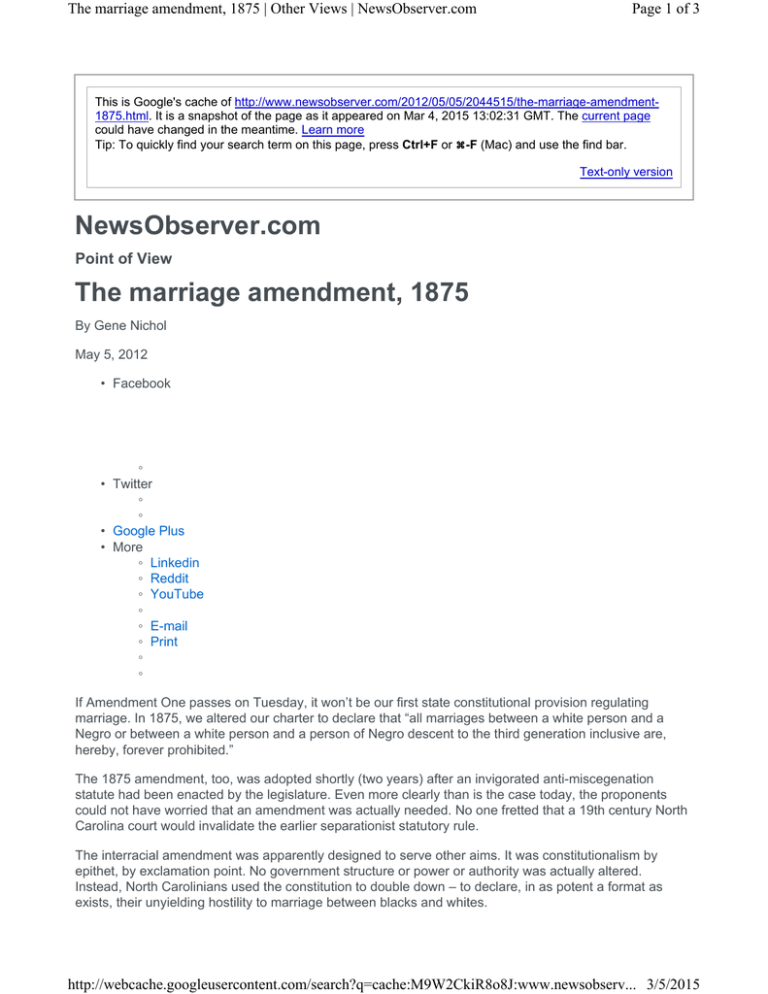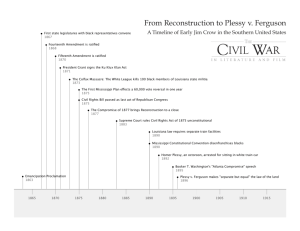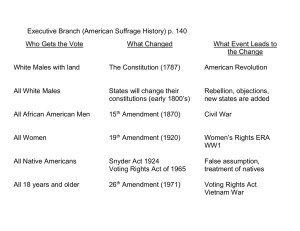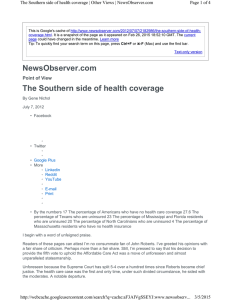
The marriage amendment, 1875 | Other Views | NewsObserver.com
Page 1 of 3
This is Google's cache of http://www.newsobserver.com/2012/05/05/2044515/the-marriage-amendment1875.html. It is a snapshot of the page as it appeared on Mar 4, 2015 13:02:31 GMT. The current page
could have changed in the meantime. Learn more
Tip: To quickly find your search term on this page, press Ctrl+F or ⌘-F (Mac) and use the find bar.
Text-only version
NewsObserver.com
Point of View
The marriage amendment, 1875
By Gene Nichol
May 5, 2012
• Facebook
◦
• Twitter
◦
◦
• Google Plus
• More
◦ Linkedin
◦ Reddit
◦ YouTube
◦
◦ E-mail
◦ Print
◦
◦
If Amendment One passes on Tuesday, it won’t be our first state constitutional provision regulating
marriage. In 1875, we altered our charter to declare that “all marriages between a white person and a
Negro or between a white person and a person of Negro descent to the third generation inclusive are,
hereby, forever prohibited.”
The 1875 amendment, too, was adopted shortly (two years) after an invigorated anti-miscegenation
statute had been enacted by the legislature. Even more clearly than is the case today, the proponents
could not have worried that an amendment was actually needed. No one fretted that a 19th century North
Carolina court would invalidate the earlier separationist statutory rule.
The interracial amendment was apparently designed to serve other aims. It was constitutionalism by
epithet, by exclamation point. No government structure or power or authority was actually altered.
Instead, North Carolinians used the constitution to double down – to declare, in as potent a format as
exists, their unyielding hostility to marriage between blacks and whites.
http://webcache.googleusercontent.com/search?q=cache:M9W2CkiR8o8J:www.newsobserv... 3/5/2015
The marriage amendment, 1875 | Other Views | NewsObserver.com
Page 2 of 3
They etched a bold antipathy to equality, and a continuing assertion of superiority, into our foundational
charter. Their official ascendancy would continue by law “forever.”
(The 1875 interracial marriage ban remained part of our state charter until a new constitution was adopted
in 1971; though the U.S. Supreme Court famously invalidated anti-miscegenation laws in the 1967
decision, Loving v. Virginia.)
Amendment One, similarly, is not constitutional alteration in the way we have traditionally conceived it.
Our federal Constitution, for example, has been amended only sparingly, less than 30 times in our long
history. Almost the entire list falls into three categories. They outline foundational liberties (1-10),
restructure government powers and processes (11, 12, 16, 17, 20, 22, 23, 25, 27); or extend rights of
membership and participation to new frontiers (13, 14, 15, 19, 24, 26). Only the 18th amendment
(Prohibition) falls outside this framework, embracing temporary substantive demands. And it was, of
course, repealed by the 21st.
The amendment we’re now considering secures no liberties, alters no decision-making structures, opens
no doors to a broader swath of the citizenry. Instead, through its phrases, a powerful majority enshrines
its supremacy over a small and disfavored minority. It expresses hostility in the most distinctive way
available. It carves it into our constitution. It declares, in effect, that “in this foundational matter, thou shalt
never be equal.” As 1875 shows, it’s not the first time.
There is an additional oddity to the Amendment One shaming effort. Its most visible patron, Speaker of
the House Thom Tillis, deems it “a generational issue.” If it passes, he noted, “I think it will be repealed in
20 years.” The demographics are apparently stark. Amendment One may enjoy a daunting congeniality in
the over-50 crowd. But those under 30 are more inclined to think the whole debate is nuts. My daughters
claim to be flummoxed: “Why don’t they just chill?”
So, an older generation seeks, effectively, to constrain a younger one. A younger cohort that, it knows,
doesn’t buy the premise. Understandably, a whiff of desperation pervades the venture. It is now or never.
But not only are the under-30s unbelieving, they have, being younger, the far greater call on the marriage
decision itself. Those of us in the twilight operate, for the most part, at a distinctly greater distance from
the defining transaction. Still, seemingly, we want to call the shots for those disinclined to listen. We yell
from the far horizon, “fight on, fight on.”
Our fervor, unfortunately, calls to mind Mark Twain’s admonition that, for the crusader, nothing needs
reforming quite so much as other people’s habits.
Gene Nichol is the Boyd Tinsley distinguished professor at UNC's Law School.
• Facebook
◦
• Twitter
◦
◦
• Google Plus
• More
◦ Linkedin
◦ Reddit
◦ YouTube
◦
◦ E-mail
◦ Print
◦
◦
http://webcache.googleusercontent.com/search?q=cache:M9W2CkiR8o8J:www.newsobserv... 3/5/2015
The marriage amendment, 1875 | Other Views | NewsObserver.com
Page 3 of 3
Join The Conversation
News & Observer is pleased to provide this opportunity to share information, experiences and
observations about what's in the news. Some of the comments may be reprinted elsewhere in the site or
in the newspaper. We encourage lively, open debate on the issues of the day, and ask that you refrain
from profanity, hate speech, personal comments and remarks that are off point. Thank you for taking the
time to offer your thoughts.
Commenting FAQs | Terms of Service
Email Newsletters >
Manage newsletter subscriptions
Tablets >
Apps and services for tablet devices
Mobile >
Apps and services for your mobile phone
Social Media >
Get updates via Facebook and Twitter
e-Edition >
Your daily paper delivered to your computer
Home Delivery >
Manage your home delivery account
Digital Subscriptions >
Manage your online subscriptions
Raleigh Jobs
Raleigh Cars for sale
Raleigh Real Estate
Raleigh Deals
Raleigh Deals and Coupons
© 2015 www.newsobserver.com and wire service sources. All Rights Reserved. http://www.newsobserver.com
http://webcache.googleusercontent.com/search?q=cache:M9W2CkiR8o8J:www.newsobserv... 3/5/2015





